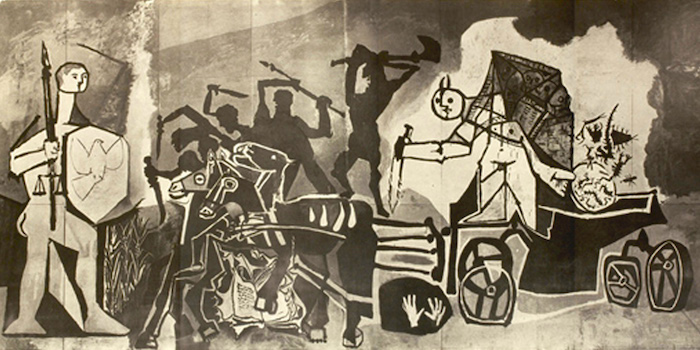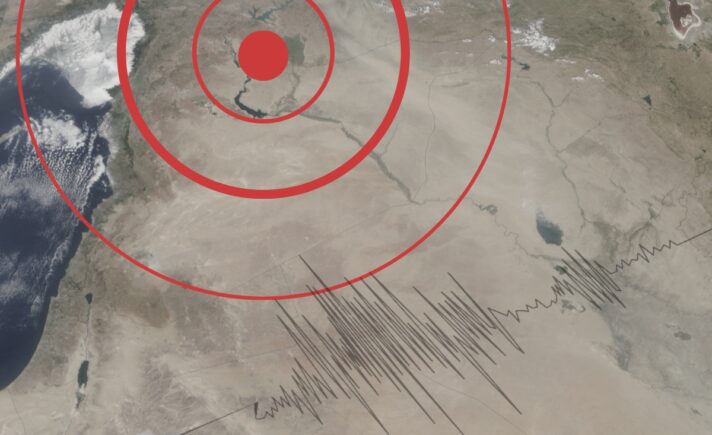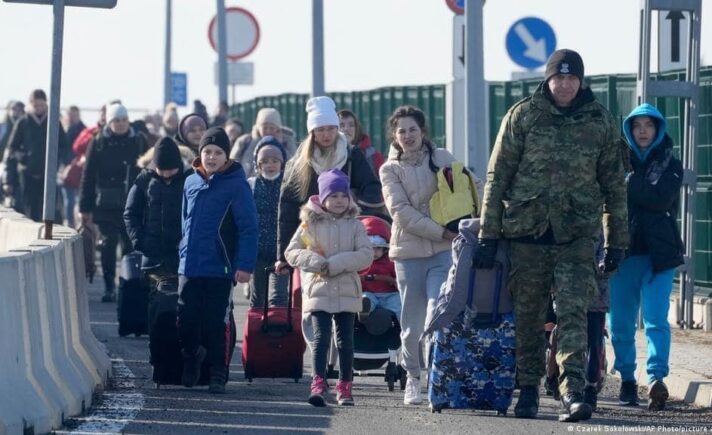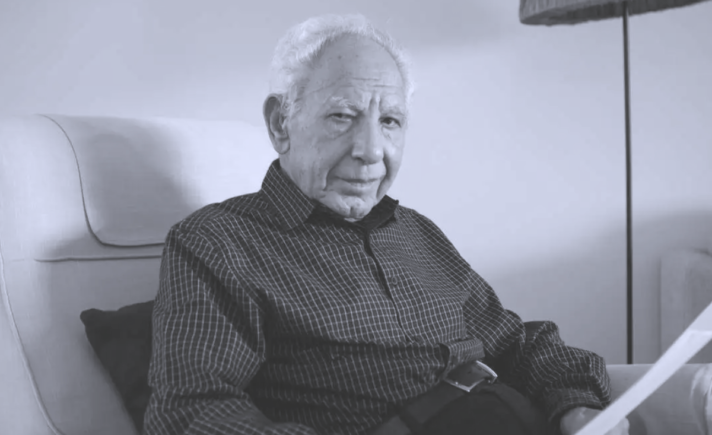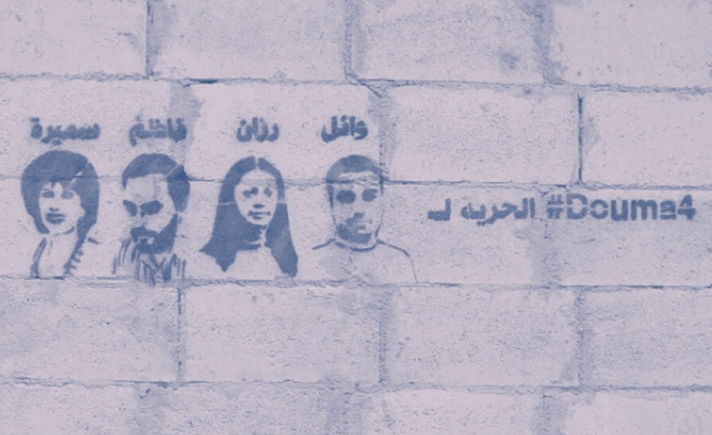[Editor’s note: The below is an edited version of a talk given by the author in Paris on 4 September. An extended version of the text is also published by Al-Jumhuriya in Arabic.]
The twentieth century was one of colonialism, imperialism, and two wars waged by the European powers on the world stage, christened the World Wars. It was the century that witnessed Nazism, fascism, and genocides. It was also the century of socialism, national liberation movements, and decolonization. Above all else, it was a century of extremely intense political and ideological conflict, ending in global victory for capitalism.
During this short century, which began with the First “World War” and finished with the end of the Cold War, according to Eric Hobsbawm, definitions of political evil varied according to one’s camp. For the nationalists in colonized countries, political evil was embodied in colonialism. For the nationalists and socialists of the “Tricontinent” of Asia, Africa, and Latin America, it was imperialism. For communists, it was capitalism. For the United States, it was socialism and communism. For liberals, it was totalitarianism. For the democrats in our countries, it was tyranny or dictatorship. In a way, these definitions remain in place today, though stripped now of the power to mobilize, no longer translatable into meaningful programs of action.
By contrast, since the Cold War ended in victory for capitalism and liberalism, terrorism has become the fundamental definition of political evil, if not the sole one. Who defines political evil today? The victors in the Western establishment, and the major, well-financed media outlets, both highly influenced by large corporations. Hardly any organized forces resist this definition; on the contrary, there is near-total acceptance and adoption of it. And while the word “terrorism” doesn’t always refer to its “Middle Eastern” or “Islamic” forms, it does so often enough to make this proviso superfluous and empty of any practical import.
Post-colonial states themselves, including those in the Middle Eastern and Islamic domains, are almost unanimous in sharing this consensus that terrorism is the enemy, especially after the “Arab Spring.” Some of these are fighting states, such as Sisi’s Egypt and Assad’s Syria. Not one of them objects to the label, let alone tries to develop an opposing one; at most, there might be the occasional mumble about terrorism being incompatible with Islam. The few remaining communist and socialist organizations have lost their old and once-powerful conception of political evil—capitalism and imperialism. If they haven’t openly adopted the narrative of Islamic terrorism as the definition of evil, the aggravation of the statist tendency in their makeup nonetheless brings them structurally closer to this narrative. In fact, these organizations often promote it, given that “fighting terrorism” is part of the same package as “secularism,” a “modern lifestyle,” and “the state;” a package with which an ageing leftism has opted to retire. Democratic and liberal groups, for whom tyranny is the evil, appear to have had their force and ideas dispersed after the defeat of the Arab revolutions.
Yet the central powers in the “Global North,” and in Israel, and in other wealthy states, see in terrorism the primary form of political evil; one incomparable to any other. These states are able to disseminate this view of theirs around the world, in a way that others cannot. In this, they find support from the modern philosophy of news. According to the well-known maxim, if a dog bites a man, nothing newsworthy has occurred, whereas if a man bites a dog, that is news. Similarly, a state killing its subjects is in the natural order of things, whereas subjects taking it upon themselves to emulate this killing is unnatural; it is news. States are expected to kill, by what is called “legitimate violence.” As for those ruled by states, they are not to kill, and if they do, it is terrorism.
The “clash of civilizations” theory that emerged after the end of the Cold War as a potential basis for a new international order held “Islamic civilization,” derived from the Islamic religion, to be among the great enemies of the West, the first one indeed. This was at a time that the violence practiced within Muslim societies against the ruling juntas or Western forces and interests had come to be almost exclusively Islamist, in the culmination of a trend that had begun in the early 1980s. This in turn had been the result of repeated defeats inflicted by Israel and its American patron on any and all forms of secular Arab resistance, be it the routing of the PLO in Beirut in 1982, or Hafez al-Assad’s “secular” regime assigning to Lebanon’s Shiite Islamist Hezbollah the task of fighting Israel at the expense of the original Lebanese leftist resistance.
The Islamization of armed struggle in our part of the world and the rising civilizational consciousness in the West indicate a shift towards a new paradigm that I call “genocracy.” This is the rule of what the Greeks called genos (the “race” or “kin”) rather than demos (“the citizenry”), and we see it eroding democracy in the US, UK, India, and increasingly in Europe. It has made democratic change in the Middle East extremely difficult. Israel and the Assad family in Syria already practice genocratic rule, as do many other Arab and Muslim countries. It’s worth mentioning that the author of the clash of civilizations thesis, Samuel Huntington, later authored another book on American identity, Who Are We? in which Hispanic immigrants were perceived to be a primary danger. Huntington has since been dubbed a “prophet for the Trump era.” I will come back to this genocratic turn later.
For some time after the end of the Cold War, it appeared that dictatorships were a political evil, and that the global political “good” was democracy. Yet from day one of this ‘new world order’ era, preached by the first Bush administration, terror was introduced as another evil. Within ten years, dictatorship had declined as the diagnosis of evil, being replaced by terrorism. When the US occupied Iraq in the spring of 2003, the junior Bush administration didn’t content itself with calling Saddam Hussein a brutal dictator who slaughtered the Iraqi people; it concocted an alleged relationship between his regime and al-Qaeda, which had committed its spectacular terrorist attack in New York a year and a half previously. In a sense, we face here a self-fulfilling prophecy. You talk about terrorism, and seek to organize international politics around confronting it, and you pressure states to this end, because you’re in need of an enemy, and sure enough that enemy wastes little time in appearing. The US failed in Iraq, which was effectively handed over to Iran, and the country that had suffered a twelve-year siege, followed by a war that annihilated its infrastructure and dissolved its state, was turned into an environment favorable to al-Qaeda and its ilk.
As the Americans’ Iraqi experience centered around fighting terrorism, the dissolution of the Iraqi state, including the army, began to seem to have been a grave mistake. The state, and especially the army and security forces who were once perceived as agents of evil, now appeared to be the antidote to terrorism. What was an enemy of democracy in our countries—the apparatuses of violence and murder, or “repressive state apparatuses,” as Louis Althusser called them—became the solution to the terrorist problem. Democracy was relegated to oblivion.
The state—and particularly what Hillary Clinton would later call in Syria’s case the “security infrastructure;” i.e., the torture and killing agencies—became the partner in combating terrorism, and thus the most that could be asked of the Assad regime prior to the revolution was that it change its behavior (vis-à-vis the powerful of the world, not its ill-fated subjects). Today, after 102 months of an impossible revolution, war, and mass murder, the situation is little different. Due to the blind application of the Iraqi lesson in the Syrian context, there has been no talk from Western powers of democracy, or democratic change, in Syria. This is despite the fact that what erupted in Syria in 2011 was a popular revolution, one which grew from the bottom up, against a genocratic regime of genocidal disposition.
Many years before the Syrian revolution, the selection of terrorism as the enemy, the War on Terror as policy, and the state’s “security infrastructure” as a solution by the leading powers of the international system was immensely convenient for Russia, where Vladimir Putin needed Chechnya’s destruction in order to become the hero of Russia’s resurrection as a world power. It was also convenient for China, against any separatist tendencies on the part of Muslim citizens; as was also the case for India’s right-wing Hindu nationalist rulers; and of course Israel, which regards all forms of resistance against its apartheid system to be terrorism (a view the United States shares). Nor were the wealthier states of Europe that lacked political direction exceptions to this. After 9/11, and the bombings in Madrid and London, terrorism became the problem here as well, alongside a rising tide of Islamophobia and a growing fear of local Muslim communities.
In the War on Terror narrative, the Assad regime of Syria found a very useful instrument indeed. In the summer of 2012, counter-terrorism laws replaced the state of emergency that had been in effect for some fifty years under the pretext of Syria being at war with Israel. Three counter-terrorism laws were issued in the first week of July, 2012, in the context of the regime’s war against the revolution. In this manner, the regime presented itself as a legal and active partner in the global War on Terror. Large numbers of Syrian revolutionaries were killed in the name of these counter-terrorism laws, and even larger numbers of men and women are still pursued by them. The War on Terror likewise forms the grand narrative of the Sisi regime in Egypt, which seized power in a military coup against the elected president, Muhammad Morsi, an Islamist from the Muslim Brotherhood.
The priorities of the powerful are the powerful priorities. When the US decides the War on Terror is a priority, it becomes an international priority. With this has come a significant transformation; namely, the securitization of politics, whereby politics becomes focused on security operations and confronting terrorist groups or their sleeper cells. What we have here is not a war fought between conventional armies and international coalitions; nor potentially severe political conflicts; but rather the granting of carte blanche to intelligence agencies to treat immigrants and the citizens of other states, particularly those from the Middle East, in a manner that turns them into right-less and homeless Homo Sacers (to borrow Giorgio Agamben’s concept). The Arab Middle East was avant-garde in this sense of securitizing politics; it is after all a paradise for genocidaires, the deprivation of rights, and immunity for crimes; it represents the future of the world in the age of the War on Terror. Today, the world’s political prisoners are Islamists, where yesterday they had been communists.
This priority given to terrorism isn’t merely a function of the genuine security threat it poses, but also its usefulness in consolidating the prevailing system, and indeed uniting the ranks behind its leading elites in confronting a formless menace. Structures of production, and the system of political control and social privileges necessitate armed stability, unceasingly repressing any challenges it faces. Public mobilization against the terrorist enemy helps mask the sources of discrimination and inequality in the system, to curb its contradictions and prevent its explosion. Terrorism responds very well to this need for mobilization, for it combines the formless and phantom quality that enables it to exist around any corner, with the fact it is in the end a limited threat in comparison to any conventional war, and has neither beginning nor end, as wars do. It plays the role witch-hunting played to consolidate church powers in previous times. The system proceeds in this way because terrorism can be a useful justification for a global state of siege, or “state of exception” (as Agamben called it), placing societies in their entirety under surveillance and political suppression. Coupling Terror with Islam facilitates the genocratic turn, the aim of which is again to unify the dominant genos against the immigrants and strangers.
New spaces of exception
Those targeted by this global securitization of politics and “state of exception” are by no means the Islamists, nor the supposed terrorists themselves, but rather all underprivileged people from the Middle East. Islamists are in fact among the foremost beneficiaries of this. For when you treat everyone as a suspect on account of their supposed religion, you actually do a service to genuine terrorists, exactly as terrorism itself necessarily punishes the innocent, only punishing criminals by coincidence or accident.
Nowhere is this securitization of politics and collective punishment clearer than in Western consulates, and the types of information required of Syrian and possibly other Middle Eastern visa applicants, with the power of the possibility of being rejected later (or before), and then the airports, where such passengers face terrible forms of discrimination. This aspect of the international system goes invisible in the Western media. The world is really divided into holders of welcome passports, akin to a master key for every door, or passe-partout; then holders of passports not warmly welcomed but nevertheless allowed to pass; then a third group holding passports that are neither welcome nor open any doors—not without intense examination and scrutiny, at least. There is a first world above the law, a second world bound by the law, and a third world underneath the law, albeit without legal protection. And there are spaces of exception Agamben did not see: airports and consulates, not to mention the entire region of the Middle East.
The War on Terror world
We know but few details about the security coordination that takes place between states waging War on Terror. The War on Terror world is one of secrecy, violence, and assassination. We do know, for instance, due to Wikileaks, that the Assad regime has previously embedded itself within groups suspected of terrorist activity, and does not hurry to attack them as the Americans do, as Assad’s senior security aide Ali Mamlouk boasted to American officials in February 2010, a year before the revolution. Hundreds, Mamlouk said, had been arrested as a result. It’s significant that “Islamist terrorism” was a shared cause that had drawn the two sides closer prior to the revolution.
On the same grounds of fighting terrorism, certain European states, such as Italy, seek now to resume contact with this regime drenched in the blood of its subjects. The French President Emmanuel Macron made a shameful statement to this effect in June 2017, saying Assad was “an enemy of the Syrian people but not an enemy of France,” adding that he saw no legitimate alternative to Assad’s rule. That is, he saw no alternative to the enemy of the Syrian people as the legitimate ruler of the Syrian people. Macron then added that France had “been coherent from the beginning” in fighting a single enemy, which was “Daesh.” In other words, terrorism is our problem, the slaughter of Syrians is their problem. Our enemy is Daesh, Assad is the enemy of Syrians, but this doesn’t make him illegitimate.
It’s not that the Western “democracies” like Assad. In all probability, their leaders despise him. Yet the combined genocratic effect of the securitization of politics and the Islamization of terrorism makes them liable to cooperate with, or at least tolerate, genocidal regimes that exclusively murder their Muslim subjects. The traditional pluralism on which democracies were based after the Second World War (including the working class and communists from within the nation state) is now challenged by a new excluded plurality, made up of immigrants, people of color, and refugees. I use the term “genocratic turn” to conceptualize this exclusion. It is for this reason that Western genocracies have elected Bashar al-Assad for us Syrians; the man who has been “electing” his own people by means of massacres and forced displacement for eight-and-a-half years. The political evil for a genocracy is the other genos, which happens to have been Muslims for the last three decades. For an anecdote illustrating the genocratic turn, allow me to mention the following: at least ten times, I have heard well-intentioned Europeans and Americans comment that Bashar studied in Britain, and was thus presumed to be a reformer, so how did he turn into such a monster? This is, to put it simply, self-flattery, narcissism, and a kind of tribal fanaticism. It is also the ethos of genocracy. Apart from the genocratic turn, the securitization of politics causes the “demo-” element in democracy to decline and the “-cracy” to increase in its makeup. A state of sheer “-cracy” without “demo” is something desirable for those Arabs and Muslims over there.
The securitization of politics
The important point I want to arrive at is that considering terrorism the fundamental political evil, and the state the political good, makes all violence practiced by states invisible, even if it reaches the level of extermination, a threshold already reached (and surpassed) in Syria. This is a door through which fascism appears to enter confidently in Egypt, for example, whose president was able to tell the head of the European Council in February 2019 that Europeans must not interfere in “our” affairs, for we have our own humanity, morals, and values, and you have yours; this came just four days after his regime executed nine young Egyptian men.
Moreover, mass extermination and fascism are not accidental developments happening far away “over there” in the Middle East. They are a structural product of an international system that has made the War on Terror its grand narrative, and made state violence the antidote. In other words, there is much political evil in the Western and international diagnosis of terrorism as the core political evil. The Obama administration treated Daesh as a greater evil, and worked to recruit Syrians to fight it on condition that they didn’t fight the regime responsible for 90% of the Syrian death toll; an example illustrating how true it is that terrorism is always the evil, and “the state” always the antidote, even when the latter is privatized and genocidal. In effect, the administration denied Syrians’ moral and political agency, their right to decide their own enemy and their country’s greater evil. This is fundamentally anti-democratic; indeed, it is a perpetuation of Assad’s unrestrained criminality by other means.
And it is rooted in the deep inequalities of the international system, consolidated by the ascendance of genocracy and decline of democracy everywhere. The definition of evil is left not to those actually suffering from it, but rather to the powerful, who in most cases practice a great deal of evil themselves, such as the US, Israel, Russia, Iran, and the Assadists. This is akin to leaving the decision of whether torture is good or bad to Assad’s intelligence agencies, or letting male sexual harassers judge the morality of harassment. Clearly, the right to determine evil ought to be in the hands of those exposed to it: Syrians, Palestinians, Egyptians, women, and many others. This doesn’t by any means absolve terrorism of evil, but rather makes its resistance a matter of defending justice for its victims, and of rejecting impunity for criminals. It’s telling that not a word has been uttered by Western or UN officials about a special tribunal for Daesh criminals, or about attaining justice for the victims of Daesh’s terrorism in Syria, Iraq, and the wider world. To speak of such justice would inevitably raise questions about justice elsewhere; for the victims of Bashar, Putin, and the Iranian regime.
The terrifying state
Is it possible for us to call these terrorist states? Or to speak of state terrorism? The problem with that is it risks concealing a deeply-ingrained reality today, which is that all states are developing terroristic properties, or are opening the doors of “exception” to confront immigration, for example, on the pretext of terrorism; an “exception” that has now become a global standard. The state’s “exceptional” monopoly on violence outside legitimacy is now a deeply-embedded structure tempting terrorist organizations to imitate and emulate states. It’s true that not all states are alike in practicing extralegal violence. Yet the states that solely practice “legitimate” violence are indulgent towards their illegitimate counterparts. In fact, they need them, as complementary spaces in the framework of the global regime of exception, to break down the moral and legal foundation of objection to the extralegal violence that states had already pioneered long before terrorists did. The context in which the US sent suspects to torture states such as Syria and Egypt after 9/11 is the same one in which a space of exception such as Guantánamo Bay, both internal and external simultaneously, was needed. This was the same context in which the torture of suspects, euphemized as “enhanced interrogation,” was tolerated. It is a context of illegitimate violence practiced by states, granting full legitimacy to nihilist terrorism.
I shall conclude with two points that seem to me fundamental in the age of terror, extermination, migration and the securitization of politics (one should add global warming). The first is that the state today is the basis of dependence, and this dependence is now political, rather than economic, in contrast to what had been the case for a generation after decolonization. Whoever owns the state wins, and obtains “legitimacy,” à la Macron. In the War on Terror age, states are legitimate by definition, though they increasingly rely on “exception.” Indeed, exception is being normalized, or becoming the rule, the way Walter Benjamin saw it in Europe between the two wars. By contrast, all resistance to tyranny or genocidal states is relegated to illegitimacy. This further strengthens the already-strong actors: especially states, mass-murdering or genocidal ones included, while weakening the already-weak resistance movements and anti-tyrannical forces, leading in many cases to their real degeneration (taking nihilist or tamed forms). In this system, Assad finds himself a natural member, and will continue to be so as long as the narrative of terrorism as the fundamental political evil remains. In truth, Assad is a War on Terror pioneer today, in a manner that makes him a more normalized member than others, deserving to be rewarded, if anything, rather than shunned.
In the international system of political dependence, or political imperialism, that securitizes politics, we refugees, exiles, and immigrants are transformed into a political proletariat stripped of rights to form political groupings and seek freedom. Worse, the more vulnerable among us face forced deportations, as both the Lebanese and Turkish governments have done recently to Syrians, and as many European powers would like to do too. (Despite their general eagerness to castigate Turkey, not one of them condemned Ankara’s latest actions; they know well they’ve been implicated in the crime ever since the 2016 deal between the EU and Turkey.) Today, migration has increasingly become the fundamental danger, to the same extent that terrorism is the fundamental evil.
As a result, political independence today is not what it was previously in the period of decolonization. Instead, independence requires working towards eradicating the global state of emergency and securitization of politics, as well as dethroning states as exclusive spaces for politics, and dispensing with the concept of sovereignty and the monopoly on violence. The combination of these two—sovereignty and monopoly over violence—is a genocidal one.
Incidentally, the traditional left inherited from the twentieth century appears utterly incapable of struggling against a world witnessing a genocratic transformation. Harking back to the twentieth century and its conflicts, and to the principle of sovereignty still imagined to be opposed to political subordination, without seeing its genocidal implications today, and its essential dependence on exception; without perceiving that sovereignty over ruled people is now the real form of subordination; to hark back to all that is old, reactionary leftism.
In its current makeup, the system of political imperialism tends to be closed, with no form of resistance to it except the terrorism (the most degenerate form of resistance) that further fortifies it, and serves its narcissism and its refusal of any alternative to it.
At a time when elitist and nihilist terrorism helps an elitist and extremist international system to reproduce itself, it becomes ever more urgent to create emancipatory resistance movements to confront the rule of mass murder and terror, racism, global warming, and the new political imperialism.
My second point is that the genocratic turn opens up the path to genocide. We know this very well in Syria (sectarian does not mean secular, as Islamophobes tend to think), and it is by no means different elsewhere in a Syrianized world. Genocide is a continuation of genocracy by other, more murderous means. The greatest political evil of our times is by no means terrorism; it is this global genocratic-genocidal tendency we experience today.
In summary, the designation of terrorism as a political evil concords with the securitization of politics, making state violence invisible, ultimately paving the path for genocide. To the extent that terrorism has been made synonymous with Islamist terrorism, this has produced international hostility to democracy in our region, rising Islamophobia worldwide, and resistance to the new forms of pluralism on which the future of democracy depends. If it seems the political elites of the Global North, and indeed everywhere, have been rapidly declining in the last two decades, I believe this is closely related to the nature of global priorities and the advance of reactionary forces around the world as a result of these ill-judged priorities.
Terrorism is indeed an evil, but it is only one face of a global structure that produces various forms of discrimination, inequality, and racism. This progressively genocratic structure is the fundamental evil, and what makes it even more so is its claim to virtue by way of fighting savage entities like Daesh and al-Qaeda; something which makes even mass-murdering states such as Assad’s, and racist states such as Israel, and imperialist reactionary states such as Russia and the US, and ultra-reactionary state like Iran, forces of “good.” Here it befits us to speak of a “banality of good:” thoughtless, unreflective, and essentially unable to think from others’ position, as Hannah Arendt formulated her idea about the banality of evil. One is led to wonder: if this is good, what’s so bad about evil?


